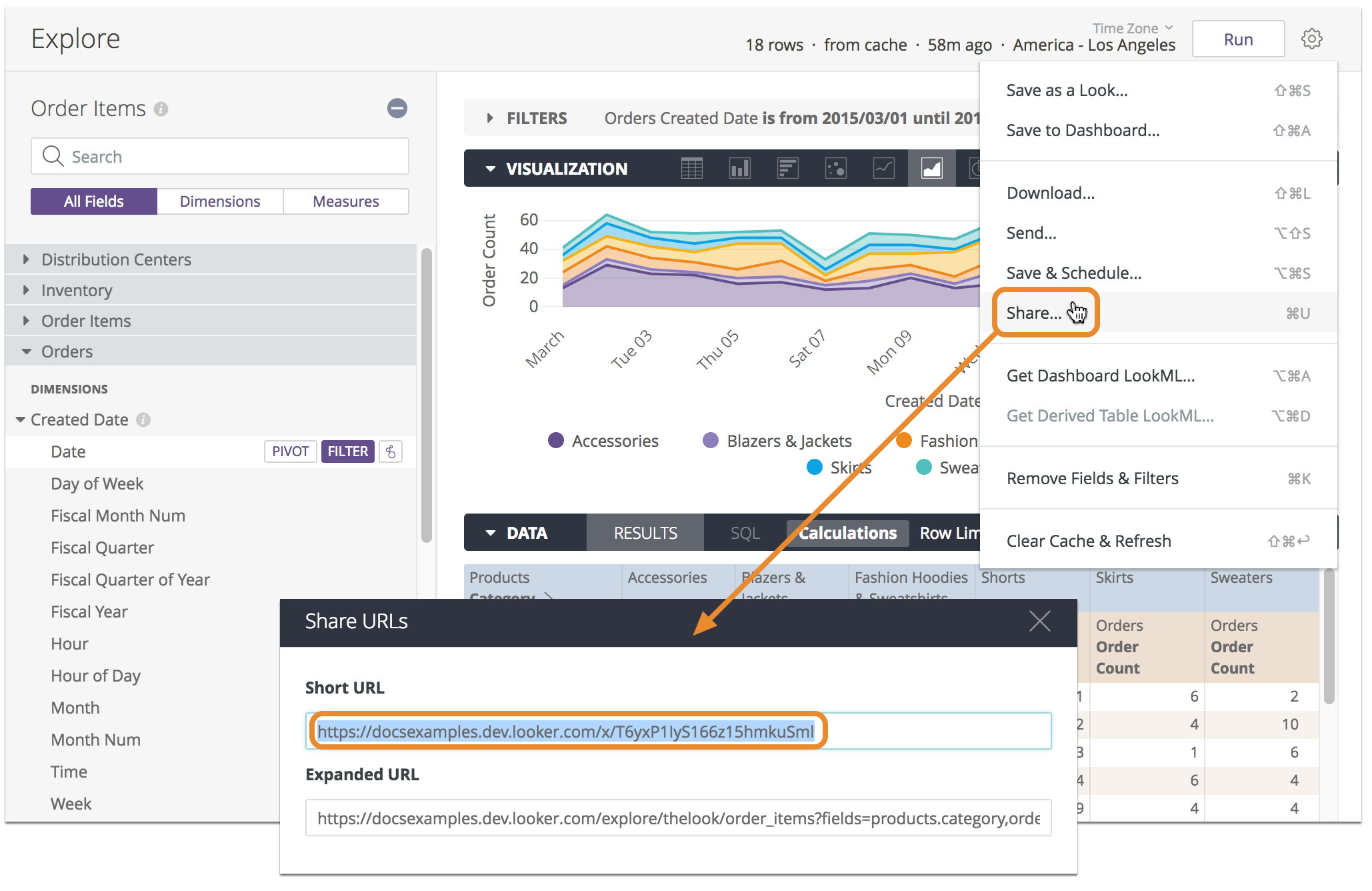在 Looker 中,您可以获取一系列网址中的任意一个,其他 Looker 用户或 Looker 实例之外的用户可以使用这些网址打开查询或 Look。如需将数据从 Looker 发送到 Looker 以外的其他目的地,您可以发布具有公开网址的 Look,然后通过本页中所述的某种方法发送和共享该网址。
共享查询的网址
运行查询后,您可以与其他 Looker 用户分享查询的网址。他们将看到相同的查询和可视化图表(如果有)。
分享网址时,请注意以下事项:
- 与他人共享网址时,您共享的是查询,而不是实际数据。这意味着,在您提取查询结果和同事运行查询之间,数据可能会发生变化。例如,如果您设置查询以查看“今天”的数据,那么如果用户在您发送网址的第二天访问该网址,数据可能会发生变化。
- 这些网址永远不会过期,也无法撤消。不过,由于该链接仅适用于有权访问您的 Looker 实例和相应数据的人员,因此发送链接不会造成安全问题。
浏览器网址
分享网址的最简单方法是从浏览器的网址栏中复制网址。

短网址
有时,当您想让同事查看您的“探索”查询时,最好分享一个较短的网址。为此,请选择页面右上角附近的齿轮下拉菜单,然后选择分享,接着复制短网址:

短网址包含探索 slug。slug 是随机选择的短字符串,用于替代网址中的内容 ID 值。例如,在短网址 https://docserver.cloud.looker.com/x/79WcoBSRqh8YVglvYe6mHL 中,字符串 79WcoBSRqh8YVglvYe6mHL 是别名。
展开的网址
分享网址窗口还提供展开的网址选项。展开的网址会显示查询的所有详细信息,包括字段和过滤条件。对于想要修改参数化网址的开发者来说,此信息可能很有用。这在自定义 LookML 字段或外部工具中通常很有用。
共享信息中心的网址
从信息中心的三点状菜单中选择获取链接选项后,系统会显示一个弹出式窗口,其中包含指向信息中心的链接,您可以复制并分享该链接。
默认情况下,在网址中包含当前的过滤条件值开关处于启用状态,链接包含过滤条件值的网址参数,这些参数与信息中心当前显示的过滤条件值一致。这意味着,如果您暂时更改了过滤条件值,使其与默认值不同,则该链接会显示应用了更改后的过滤条件值的信息中心。如果您未临时更改任何过滤条件值,则该链接会显示具有默认过滤条件值的信息中心。如果启用了交叉过滤,该链接还会显示当前应用于信息中心的任何交叉过滤条件。
您还可以通过选择获取链接来查看信息中心 slug。slug 是随机选择的短字符串,用于替代网址中的内容 ID 值。例如,在以下信息中心网址 https://docserver.cloud.looker.com/dashboards/CQ1fu99Z9Y1ggq2wcHDfMm 中,字符串 CQ1fu99Z9Y1ggq2wcHDfMm 是 slug。
如果您停用在网址中包含当前的过滤条件值开关,则弹出式窗口会显示一个较短的链接,该链接会显示具有默认过滤条件值且未应用任何交叉过滤条件的信息中心。
如需查看信息中心,知道链接的任何人必须有权访问保存信息中心的 Looker 实例,以及有权访问图块所基于的信息中心和模型。

